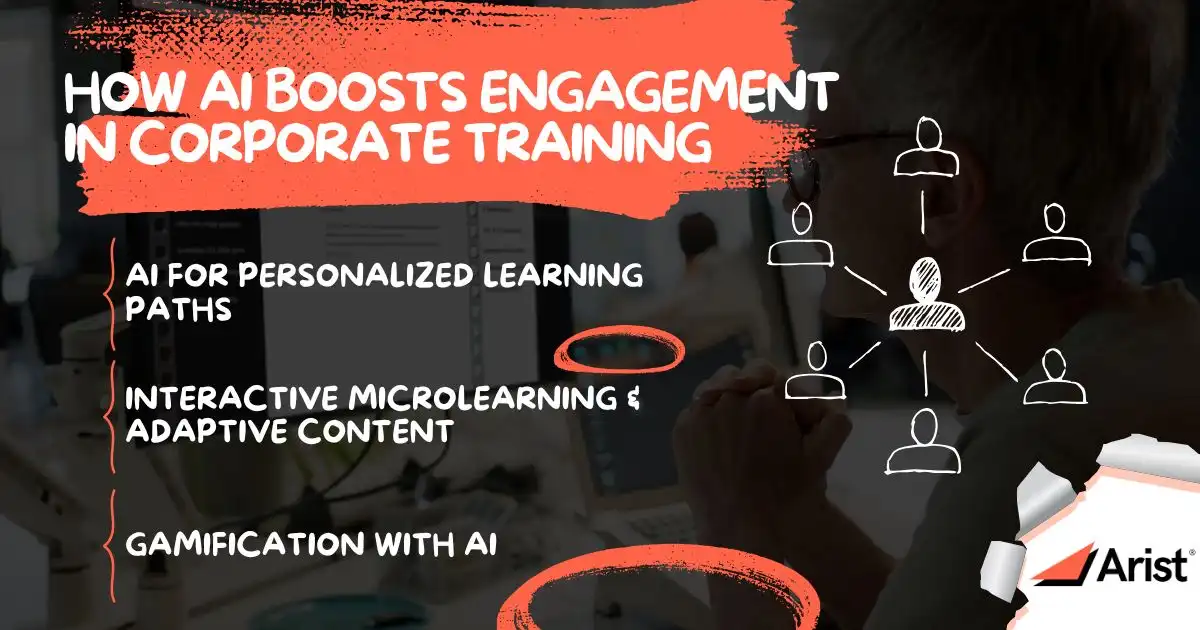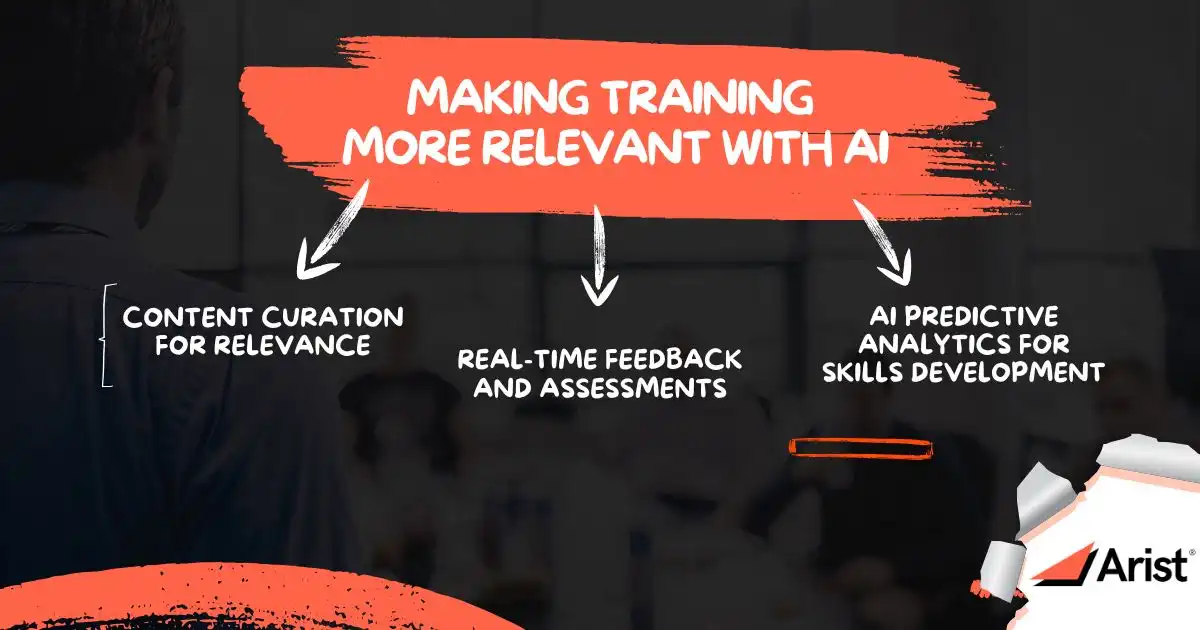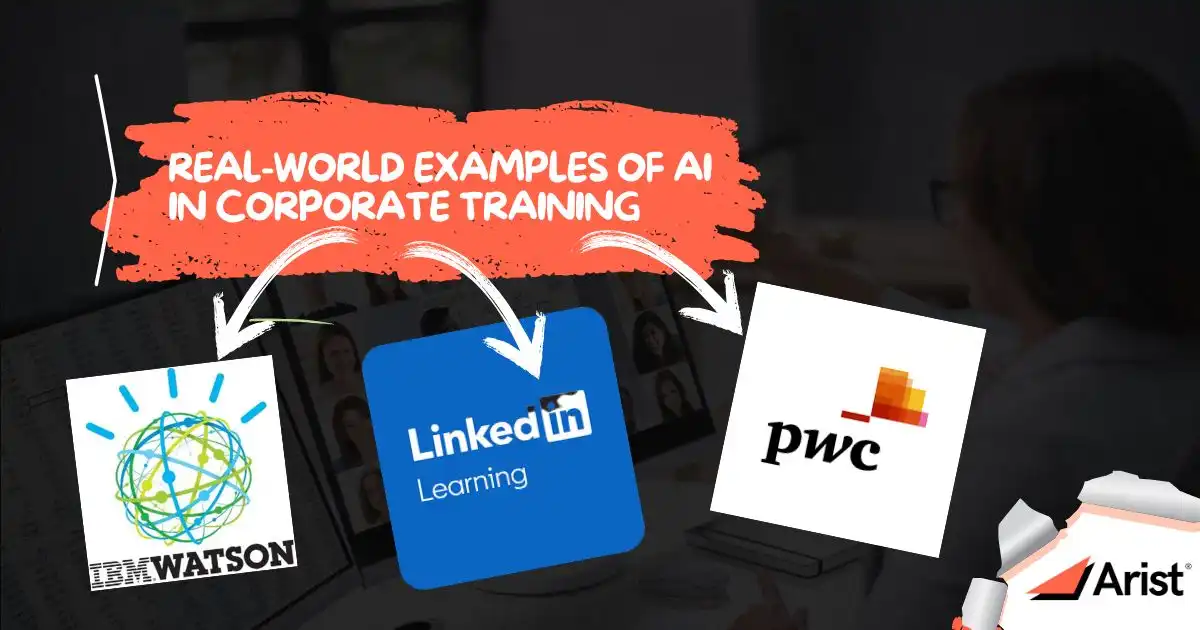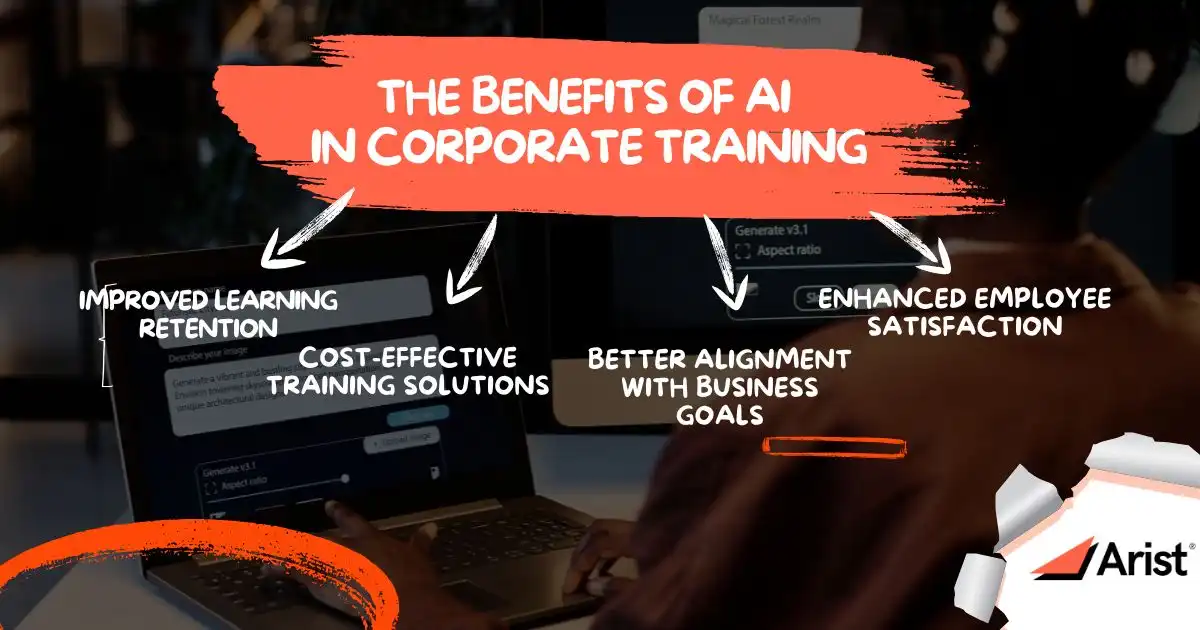How AI in Corporate Training Transforms Engagement & Relevance
Corporate training has traditionally been seen as a chore – a necessary part of compliance or skill-building that’s often repetitive, one-size-fits-all, and a little dull. But things are changing fast!
Thanks to the rise of Artificial Intelligence (AI), corporate training programs are now more engaging, relevant, and personalized than ever before. In fact, AI is completely reshaping the way organizations deliver training by making it smarter, adaptive, and tailored to the needs of each employee. AI tools for learning and development like Arist are making it possible to tailor training in ways that were once unimaginable, boosting both engagement and content relevance.
In this article, we’ll explore the ways AI improves engagement and content relevance in corporate training, and why so many companies are investing in AI-powered learning solutions. From customized learning paths to interactive simulations, AI in learning and development is turning corporate training into a dynamic, impactful experience.
AI Corporate Training: How it Boosts Engagement

One of the biggest challenges in corporate training is keeping employees engaged. We’ve all been there – stuck in a monotonous e-learning module, clicking through slides just to get to the end. AI, however, brings a new level of engagement to the training environment. Here’s how:
1. AI for Personalized Learning Paths
Imagine if every employee could have a training program tailored just for them. With AI, this is entirely possible. AI algorithms analyze individual learning styles, past performance, and skill gaps to create customized learning paths for each person. This level of personalization ensures that employees aren’t forced to wade through material they already know, which keeps them engaged and motivated to learn.
2. Interactive Microlearning & Adaptive Content
Gone are the days of static, pre-packaged training modules. AI can generate adaptive content that adjusts based on how the learner is performing. For example, if an employee is struggling with a particular concept, AI can introduce simpler content or provide additional examples to reinforce understanding. Arist is an AI-powered training platform that takes an innovative approach to corporate learning by delivering content in short, easily digestible text messages.
Conversely, if they’re excelling, it can offer more challenging material. This dynamic approach not only improves engagement but also helps employees build skills more effectively.
3. Gamification with AI
AI-powered gamification is another powerful tool to increase engagement. By turning training into a game-like experience, employees are incentivized to compete, earn points, and achieve badges. AI can analyze which types of game mechanics resonate with different users and personalize the experience accordingly. Whether through quizzes, scenario-based simulations, or even VR environments, gamified learning makes the process much more enjoyable.
AI in Learning and Development (AI in L&D): Making Training More Relevant

In addition to boosting engagement, AI makes training content more relevant to employees’ real-world roles and responsibilities. Here are a few ways AI achieves this:
1. Content Curation for Relevance
AI can act as a smart curator, recommending training materials based on each employee's role, current skill set, and career goals. It scans vast amounts of information and curates the most relevant content, ensuring that employees get what they need without being overwhelmed by irrelevant information. This not only saves time but also makes the learning experience far more effective.
2. Real-Time Feedback and Assessments
AI can provide real-time feedback during training, allowing employees to immediately see how they’re doing and where they need improvement. Unlike traditional assessments, which often feel disconnected from real tasks, AI-driven assessments can mimic actual workplace scenarios. This practical, hands-on approach makes the training more relevant, as employees can directly see the impact of what they’re learning.
3. AI Predictive Analytics for Skills Development
AI’s predictive capabilities allow organizations to analyze corporate training trends in employee performance and skill gaps. By identifying which skills will be needed in the near future, AI helps HR and L&D teams proactively plan training programs that align with both individual and organizational goals. This keeps employees equipped with relevant skills that match the company’s evolving needs.
Real-World Examples of AI in Corporate Training

Several companies are already embracing AI to create more engaging and relevant training experiences. Here’s a closer look at how a few organizations are leveraging these advanced technologies:
IBM’s Watson Talent: IBM uses its AI-powered Watson Talent to create customized learning recommendations for employees. By analyzing performance data and employee preferences, Watson Talent provides content suggestions that keep training relevant and aligned with individual career paths.
LinkedIn Learning: LinkedIn Learning uses AI algorithms to recommend courses based on a user’s job title, industry, and viewing history. This AI-driven approach helps professionals access content that’s both timely and relevant to their roles.
PwC’s Virtual Reality Training: PwC is experimenting with AI-driven virtual reality simulations to train employees in areas like diversity and inclusion, leadership, and client interactions. VR, combined with AI, provides an immersive experience that keeps employees engaged and offers practical, hands-on learning.
The Benefits of AI in Corporate Training

AI in corporate training offers numerous benefits, not only for the employees but for the organization as a whole. Here are some key advantages:
Improved Learning Retention: With AI’s personalized, interactive approach, employees retain information more effectively compared to traditional training methods.
Cost-Effective Training Solutions: AI in training can reduce the time employees spend in training, which translates to cost savings. Plus, AI tools for training and development often require less human oversight, freeing up HR and L&D resources.
Better Alignment with Business Goals: By identifying skills gaps and tailoring training content, AI ensures that employees are learning skills that contribute to organizational objectives.
Enhanced Employee Satisfaction: Employees are more likely to appreciate training that feels relevant to their career growth and not just a box to check. AI’s ability to personalize content based on individual goals boosts satisfaction and engagement.
Potential Challenges of AI in Corporate Training
Of course, implementing AI in corporate training isn’t without its challenges. Privacy concerns, data security, and the potential for bias in AI algorithms are all issues that companies need to manage carefully.
Additionally, an over-reliance on AI could lead to a lack of human interaction, which is also an essential part of learning and development. Organizations must find a balance between automation and human touch to get the best results.
AI is Revolutionizing Corporate Training for Modern Teams
AI is transforming corporate training by making it more engaging, personalized, and relevant to employees’ day-to-day work. From adaptive learning paths to real-time feedback and gamified experiences, AI’s impact on corporate training is profound and growing.
For businesses looking to keep their teams sharp, motivated, and aligned with company goals, investing in AI-powered training solutions is becoming less of a luxury and more of a necessity.
As AI in training continues to advance, the future of corporate training looks promising – with richer, more immersive, and increasingly relevant learning experiences just around the corner.
Arist Team
Bring
real impact
to your people
We care about solving meaningful problems and being thought partners first and foremost. Arist is used and loved by the Fortune 500 — and we'd love to support your goals.
Curious to get a demo or free trial? We'd love to chat:


